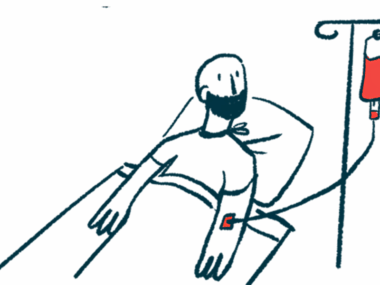Use of off-label Vyvgart successful in case of hard-to-treat gMG
Patient had tested negative for disease-driving self-directed antibodies
Written by |

A woman with hard-to-treat generalized myasthenia gravis (gMG) who was seronegative, or tested negative for disease-driving self-directed antibodies, was successfully treated with off-label Vyvgart (efgartigimod alfa-fcab), as reported in a case study from Italy.
According to researchers, this case provides evidence that limiting Vyvgart to MG patients with self-directed antibodies against the acetylcholine receptor (AChR) might be “shortsighted and could limit therapeutic options for patients with refractory seronegative gMG.”
Further, the team noted that its “findings are in line with other reports suggesting the potential efficacy of newly developed drugs even in seronegative MG patients.” However, the researchers added that “prolonged longitudinal data assessing safety and efficacy are lacking.”
The case study, “Overcoming therapeutic challenges: Successful management of a supposedly triple seronegative, refractory generalized myasthenia gravis patient with efgartigimod,” was published in the European Journal of Neurology.
Patient’s condition worsened despite myriad gMG treatments
Myasthenia gravis, known simply as MG, is an autoimmune disease in which self-directed antibodies, called autoantibodies, target and damage components of the neuromuscular junction — the region where nerves connect to the muscles they control. Such damage disrupts the communication between nerves and muscles, resulting in the hallmark MG symptoms of muscle weakness and fatigue.
First-line treatment often involves the use of acetylcholinesterase inhibitors like Mestinon (pyridostigmine bromide), which are designed to improve nerve-muscle communication and enhance muscle strength by boosting the effects of acetylcholine — a chemical messenger released by nerve cells that instructs muscle cells to contract. Additional treatments, such as corticosteroids or other nonsteroidal therapies, can also be prescribed to suppress immune responses.
Complement inhibitors are another class of MG therapies that suppress the activation of the complement system, a part of the immune system thought to participate in the autoimmune attacks that drive the disease. These therapies are approved only for patients who test positive for anti-AChR antibodies, the most common type of MG-driving autoantibodies.
Some patients, however, are refractory, meaning their disease doesn’t respond to long-term treatment with corticosteroids or immunosuppressants, and/or they experience side effects that are intolerable.
Thus, despite all these therapies, MG patients who are refractory to standard treatments and test negative for autoantibodies have limited options for easing disease symptoms.
That was the case for a previously healthy woman in Italy who, at the age of 28, developed generalized weakness and fluctuating weakness in certain muscles in the face and neck. An examination found signs of impaired neuromuscular junction function.
Treatment with an acetylcholinesterase inhibitor swiftly eased her symptoms, yet she tested negative for autoantibodies using standard assessment tools. Based on these findings, she was diagnosed with seronegative MG.
Her condition continued to worsen despite initial treatment with steroids and Mestinon. Additionally, no significant improvement was later on seen after she underwent a thymectomy — a surgery to remove the thymus gland, which is thought to contribute to the production of the autoantibodies that drive MG.
Over the years, several attempts were made to introduce steroid-sparing therapies to help reduce the steroid dosage the patient was being given while keeping symptoms under control. These, however, proved to be ineffective in preventing recurrent myasthenic crises, or episodes of life-threatening weakness in respiratory muscles. Those recurring crises required the woman to receive mechanical breathing support. She also received add-on intravenous immunoglobulin infusions, but the benefits were suboptimal and short-lived.
Due to her poor overall responses, the woman was given monthly courses of plasma exchange therapy — but again with limited results. The benefits of such treatment lasted about three weeks, followed by a rapid clinical decline in the fourth week. While it helped control her disease, plasma exchange led to severe blood clotting events and infections, further worsening her overall quality of life.
Substantial improvements seen with Vyvgart over 5 treatment cycles
Because of the severe and refractory nature of her illness, the patient was allowed to receive Vyvgart, a therapy exclusively approved for MG adults with anti-AChR antibodies. The therapy was given on an off-label basis through a compassionate use program. Over the course of eight months, she received five treatment cycles.
Her condition substantially improved between the first and fifth cycles, as assessed by several scales of disease severity and impact on quality of life, which reached their lowest scores by the third week of each treatment cycle.
During this period, she did not need plasma exchange and could return to work. No added risks or infections were reported. Blood samples collected before Vyvgart were sent for high-sensitivity testing, confirming the presence of autoantibodies against AChR.
“Our case report focuses on the diagnostic and therapeutic challenge posed by seronegative refractory gMG,” the researchers wrote. “Standard testing methods are inadequate at detecting autoantibodies in most seronegative MG patients.”
The team suggested that further studies could be done into potential Vyvgart use in a broader patient population, with an evaluation of whether such treatment would be cost-effective.
“Drawing inspiration from the history of our patient, we argue that the enduring clinical efficacy of this treatment could lead to a significant reduction in the use of concurrent therapies and the need for repeated hospitalizations,” the researchers wrote.





Leave a comment
Fill in the required fields to post. Your email address will not be published.